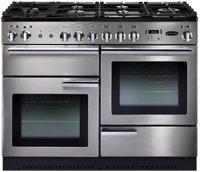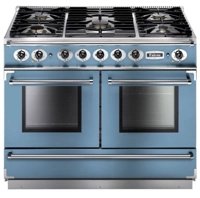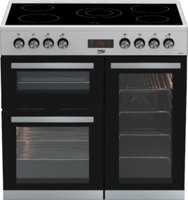Choosing the right Range Cooker - dual fuel, gas or electric
Choosing the right cooking appliance is a crucial decision for any kitchen, and the debate between dual fuel, gas, and electric ranges has been a longstanding one. Each option comes with its own set of advantages and disadvantages, catering to different cooking preferences and needs. In this article, we will delve into the key differences between dual fuel, gas, and electric ranges to help you make an informed decision for your kitchen.
- Dual Fuel Ranges
Dual fuel ranges combine the best of both worlds by featuring a gas cooktop and an electric oven. The gas cooktop provides precise temperature control, making it ideal for tasks that demand quick adjustments, such as boiling or sautéing. On the other hand, the electric oven distributes heat evenly, ensuring consistent baking results.
Pros:
- Versatility: Offers the flexibility of both gas and electric cooking methods.
- Precision: Gas cooktops allow for instant temperature changes, while electric ovens provide even baking.
Cons:
- Cost: Dual fuel ranges tend to be more expensive than their gas or electric counterparts.
- Installation: Requires both gas and electric connections, which might complicate installation.
- Gas Ranges
Gas ranges have long been a staple in kitchens, prized for their immediate response to temperature adjustments and the visual control offered by an open flame. The cooktop consists of burners fueled by natural gas or propane.
Pros:
- Control: Immediate temperature adjustments with a visible flame.
- Cost: Gas is often more cost-effective than electricity.
Cons:
- Evenness: Oven heat distribution can be less even compared to electric ovens.
- Ventilation: Requires proper ventilation due to the combustion process.
- Electric Ranges
Electric ranges are known for their smooth, flat cooktops and electric ovens. The cooktop elements are powered by electricity, providing consistent heat for cooking. Electric ovens typically offer precise temperature control, making them suitable for baking.
Pros:
- Even Heating: Electric ovens distribute heat more evenly.
- Safety: No open flames, reducing the risk of gas leaks or burns.
Cons:
- Response Time: Slower to adjust temperatures compared to gas.
- Operating Cost: Electric ranges can be more expensive to operate.
Conclusion
The choice between dual fuel, gas, and electric ranges ultimately depends on your cooking style, preferences, and budget. Dual fuel ranges offer a blend of precision and versatility but come at a higher cost. Gas ranges provide immediate temperature control and cost savings, while electric ranges offer even heating and safety. Understanding the nuances of each type will empower you to make a well-informed decision based on your culinary needs and lifestyle. Whether you are a passionate chef or a casual home cook, the right range can elevate your cooking experience to new heights.
We take pride in being a traditional kitchen appliance retailer, offering a vast range of high-quality products to our valued customers. Located in the heart of Liverpool, our large showroom provides an immersive shopping experience, allowing you to explore and interact with our appliances in person. What sets us apart is our commitment to efficiency and convenience. Every appliance listed on our website is readily available in our extensive inventory, ensuring immediate delivery or collection for our customers. Our collection service operates seven days a week, accommodating your schedule, while our delivery service runs from Monday to Saturday, ensuring that your new kitchen appliances reach you promptly and with the utmost convenience. At our showroom, we not only offer the latest in kitchen technology but also prioritize making your shopping experience as seamless as possible.



